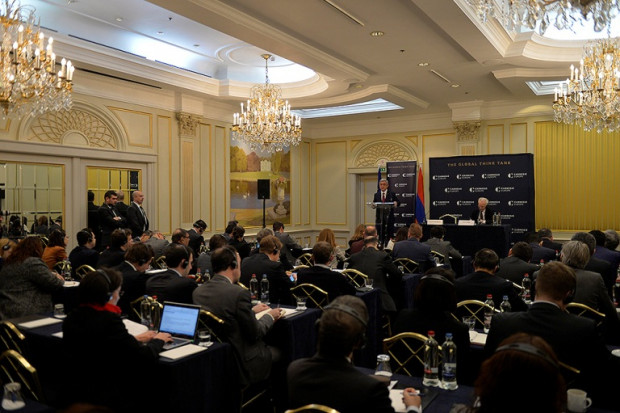Azerbaijan’s new attempts to engage in a military adventure can have unpredictable consequences for Azerbaijan itself.
The President of Armenia, Serzh Sargsyan, on Tuesday stated the aforementioned in his address at Carnegie Europe think tank in Brussels, the capital city of Belgium.
In his address, Sargsyan noted, in particular:
The reckless four-day military escapade carried out by Azerbaijan in April 2016 was the epitome of Baku’s years-long belligerent policy and ideology. It dealt a heavy blow to the NK peace process. Azerbaijani aggression proved once again that the struggle of the people of Artsakh for living safely on their own land and be free has no alternative. This is not an opinion, but the reality created and imposed on us by Azerbaijan’s policy.
There are strictly defined agreements reached in Vienna and Saint Petersburg after the April war, related to upholding of the unlimited tri-party ceasefire agreements of 1994-1995 and on the creation in the conflict zone of the mechanisms to investigate violations of the ceasefire regime. However, Azerbaijan, true to its long-standing tradition, refuses to implement these agreements and declares that their implementation will allegedly reinforce the existing status quo in Nagorno Karabakh.
If Azerbaijan is truly concerned with changing the status quo in Nagorno Karabakh, there is only one way to do it – to recognize the right of the people of Nagorno Karabakh for self-determination.
It would be naïve to assume that Azerbaijan was unaware of the heavy blow it dealt to the peace process, to reinforcing the status quo, to pushing pack the peace process. Obviously, Baku is using the Nagorno Karabakh conflict to divert the attention and rising discontent within its own society related to the pressing social and economic issues and blatant violations of human rights in the country.
For that very reason, Baku recently stated that Nagorno Karabakh was its “internal affair.” It has been for years that the Co-Chairs of the OSCE Minsk Group, namely France, Russia and the US, who form the agreed international format, have been mediating the Nagorno Karabakh issue. Someone in Baku might have had a bad dream and based on that deluded himself that these three major international actors have put aside their own complicated issues and suddenly chose to engage in Azerbaijan’s “internal affair.”
This was just an episode from the theater of absurd which is being staged in Baku. We encounter it almost on a daily basis. However, sincere outbursts also happen. On one such instance, the leader of Azerbaijan, trying to boost his very significance in front of his subordinates, admitted publicly that at the negotiations behind the closed doors he was under pressure to recognize independence of Nagorno Karabakh, and he was the sole person able to withstand the pressure coming from the Co-Chairs of the OSCE Minsk Group.
The Co-Chairs of the OSCE Minsk Group, as mediators, are also called upon to prevent possible escalation in the area of conflict. Negotiations conducted under the shelling hold no promise.
That is the stage the Artsakh conflict resolution process has reached now. Both Artsakh and Armenia are in principle against the use of force and are in favor of solving the problem as soon as possible through peace negotiations.
Azerbaijan’s new attempts to engage in a military adventure can have unpredictable consequences for Azerbaijan itself. Armenia, as the guarantor of Nagorno Karabakh’s security, has stated on many occasions that it was ready to respond adequately to any attempt to use force.
Despite Azerbaijan’s incessant threats, the people of Artsakh continue to build resolutely their own future. On February 20, a referendum took place in Nagorno Karabakh on constitutional reforms.
The people of Artsakh have voted for the presidential model of governance. As you see, with regard to the system of governance, the positions of Armenia and Nagorno Artsakh differ; however, the resolve to build a democratic system is unwavering. The people of Artsakh have been manifesting that resolve for decades – they formed through the elections their executive, legislative, and local government bodies. The people of Artsakh dream of no other future and are busy with creating a free society based on human rights and basic liberties.
Just as anyone in the democratic world, people of Artsakh have every right to enjoy all universal and fundamental freedoms. People of Artsakh know better than anyone the price of being free because they paid for it with the blood of their sons. Today, Artsakh is building democracy under fire. Azerbaijan, meanwhile, is trying to silence the voice of freedom, urging to condemn democratic processes in Artsakh. While Artsakh is taking consistent steps on its path towards a consolidated democracy, its neighbor Azerbaijan, especially at the current stage, has been taking consistent steps towards the establishment a totally hereditary tyranny.
I see that all gathered here are notable experts. If there are alternative mechanisms of governance and self-organization for unrecognized entities, I would appreciate if you let us know. It is hard to explain to our colleagues in Artsakh why the unrecognized Kosovo can cooperate with the OSCE/ODHIR and form its governmental institutions democratically, while some think that the people of Artsakh cannot do it. Even though Armenia has not recognized independence of Kosovo, by the virtue of financing the OSCE budget we are part of that process. I am confident that the international community should start to gradually assist Artsakh in its democratic processes, regardless of the status of the Nagorno Karabakh Republic.























